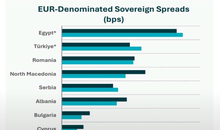
 Flash News
Flash News
Drenova prison police officer arrested for bringing drugs and illegal items into cell
Lavrov: NATO is risking self-destruction with new military budget
Kurti and Vučić "face off" tomorrow in Skopje
Construction worker dies after falling from scaffolding in Berat
The prosecution sends two Korça Municipality officials to trial

By Nikola Kedhi - Newsmax
In a region defined by instability and historical resentment, Albania has proven to be one of America's strongest allies.
From its early support for NATO to its unwavering alignment with Washington in the Balkans, Albania has consistently been on the side of the transatlantic community.
But loyalty alone does not ensure democracy. A decade of socialist rule has led to institutional breakdown, mass emigration, authoritarianism, and growing public disillusionment.
The time has come for a conservative alternative, rooted in democratic change, strong and stable institutions, free markets, and family values.
The Democratic Party of Albania (DP), the traditional champion of anti-communist freedom and Euro-Atlantic integration, is preparing to come to power. Its platform, recently presented in Tirana, is a revolutionary vision: economic freedom through supply-side reforms, flat taxes, deregulation; pro-family policies to address the demographic crisis; investments in law and order, defense, energy independence, and curbing bureaucratic overreach.
It is an unapologetically conservative platform, a long-term historical alternative to make Albania a model of democracy and capitalism.
This vision is not driven by ideology, but by necessity. Albania is going through a national survival crisis. More than 1.1 million people have left the country since 2013. The birth rate has fallen. Youth unemployment and corruption are endemic.
The judicial system, hijacked by the Soros network under the guise of 'reform,' selectively silences the opposition while protecting government loyalists. Institutions once touted as anchors of democracy have been emptied, replaced by a facade of legalism.
The conservative opposition has endured throughout. Sali Berisha, a conservative statesman and former president and prime minister of Albania, who brought the country into NATO and lifted visa regimes with the EU, has endured political persecution of a kind not seen in a European democracy.
He returned to active politics to save his party and his country, after more than eight years away from any official position. In 2021, Berisha was banned from entering the US, a move now widely seen as politically motivated and lobbied by Soros and the prime minister, and discredited by many American conservatives.
Once praised by the US for his anti-corruption efforts, Berisha now benefits from growing support among American and European conservatives who see the Biden-era sanctions process as abused and consider Berisha the statesman Albania needs to save it.
On May 8, Axios White House Correspondent Marc Caputo published a State Department statement on Berisha's sanctions, effectively nullifying the non grata status:
"We regularly grant exemptions to facilitate travel of certain individuals to the U.S. in accordance with international obligations and our national interests. As such, we will not allow our foreign policy interests or relationship with Albania to be held hostage by the politicized decisions of the Biden era."
However, Berisha has demonstrated leadership of a revitalized conservative base. His movement has endured state repression, media censorship, and international neglect.
This insistence is not simply personal, it is an expression of a social force, a demand of the Albanian people for dignity, sovereignty and the restoration of democratic order. The conservative movement he leads has overcome unimaginable obstacles and has managed to unite the opposition and sensitize the international community.
Now, they seem poised to lead Albania into what they call a golden age, heavily influenced by the Reagan and Trump revolutions. In fact, Mr. Berisha was the first and only opposition leader in Europe to support President Trump and has spoken out against Trump’s political persecution, mirroring Berisha’s.
Washington has a vested interest in fostering this democratic growth. Albania is one of the last deeply pro-American strongholds in Southeast Europe. Its regional influence, military bases, and ports are strategic assets at a time of growing Russian and Chinese influence in the Balkans.
However, the United States has too often confused loyalty to individuals with loyalty to democratic principles. In Albania's current situation and the geopolitical challenges facing the region, a statesman with pro-Western experience is needed to ensure continued Euro-Atlantic integration.
Berisha, often accused of being too pro-American, is one of the few who connects European center-right traditions with conservative American values.
A new conservative government in Tirana would refocus the country on the values that initially drew Albania to the West: limited government, private property, intact families, and free markets - all in line with the agenda of the new Trump administration, which would find in a Berisha government a reliable ally on the Old Continent.
The DP platform suggests a drastic reduction in the tax code, easing the burden on small businesses, and attracting investments from the diaspora.
Latest news



Second hearing on the protected areas law, Zhupa: Unconstitutional and dangerous
2025-06-30 22:18:46



Israel-Iran conflict, Bushati: Albanians should be concerned
2025-06-30 21:32:42

Fuga: Journalism in Albania today in severe crisis
2025-06-30 21:07:11
"There is no room for panic"/ Moore: Serbia does not dare to attack Kosovo!
2025-06-30 20:49:53

Temperatures above 40 degrees, France closes nuclear plants and schools
2025-06-30 20:28:42
Lavrov: NATO is risking self-destruction with new military budget
2025-06-30 20:13:54
Turkey against the "Bektashi state" in Albania: Give up this idea!
2025-06-30 20:03:24

Accused of sexual abuse, producer Diddy awaits court decision
2025-06-30 19:40:44



Kurti and Vučić "face off" tomorrow in Skopje
2025-06-30 18:44:12
Tourism: new season, old problems
2025-06-30 18:27:23


Construction worker dies after falling from scaffolding in Berat
2025-06-30 17:51:44




Almost free housing: East Germany against depopulation
2025-06-30 16:43:06

Hamas says nearly 60 people killed in Gaza as Trump calls for ceasefire
2025-06-30 16:14:15
Drownings on beaches/ Expert Softa: Negligence and incompetence by institutions!
2025-06-30 16:00:03


European ports are overloaded due to Trump tariffs
2025-06-30 15:30:44
The prosecution sends two Korça Municipality officials to trial
2025-06-30 15:19:54

Lezha/ Police impose 3165 administrative measures, handcuff 19 drivers
2025-06-30 14:55:04
Young people leave Albania in search of a more sustainable future
2025-06-30 14:47:52
Record-breaking summer, health threats and preventive measures
2025-06-30 14:36:19


Constitution of the Parliament, Osmani invites political leaders to a meeting
2025-06-30 14:07:54

Heat wave 'invades' Europe, Spain records temperatures up to 46 degrees Celsius
2025-06-30 13:42:02
Accident in Vlora, car hits 2 tourists
2025-06-30 13:32:16

Kurti confirms participation in today's official dinner in Skopje
2025-06-30 13:03:27

Fight between 4 minors in Kosovo, one of them injured with a knife
2025-06-30 12:38:45

Report: Teenage girls the loneliest in the world
2025-06-30 12:20:40
Commissioner Kos and Balkan leaders meet in Skopje on Growth Plan
2025-06-30 12:07:59
Wanted by Italy, member of a criminal organization captured in Fier
2025-06-30 11:55:53
Hundreds of families displaced by wave of Israeli airstrikes in Gaza
2025-06-30 11:45:17

Zenel Beshi: The criminal who even 50 convictions won't move from Britain
2025-06-30 11:23:19
A new variant of Covid will circulate during the summer, here are the symptoms
2025-06-30 11:14:58


"Partizani" case, trial postponed to July 21 at the Special Court
2025-06-30 10:41:05
Uncontrolled desire to steal, what is kleptomania, why is it caused
2025-06-30 10:30:08
Requested change of security measure, hearing for Malltez postponed to July 7
2025-06-30 10:24:32


Output per working hour in Albania 35% lower than the regional average
2025-06-30 09:54:35


The trial for the "Partizani" file begins today
2025-06-30 09:27:57
22 fires in the last 24 hours in the country, 2 still active
2025-06-30 09:21:28
How is the media controlled? The 'Rama' case and government propaganda
2025-06-30 09:13:36
German top diplomat: Putin wants Ukraine to capitulate
2025-06-30 09:00:07
Foreign exchange, how much foreign currencies are sold and bought today
2025-06-30 08:44:38
Chart/ Sovereign risk for Albania from international markets drops significantly
2025-06-30 08:26:38
Horoscope, what do the stars have in store for you?
2025-06-30 08:11:44
Clear weather and passing clouds, here is the forecast for this Monday
2025-06-30 07:59:32
Morning Post/ In 2 lines: What mattered yesterday in Albania
2025-06-30 07:47:37
Milan make official two departures in attack
2025-06-29 21:57:23
6 record tone
2025-06-29 21:30:46
4-year-old girl falls from balcony in Lezha, urgently taken to Trauma
2025-06-29 21:09:58


Assets worth 12 million euros seized from cocaine trafficking organization
2025-06-29 19:39:43
Fire in Durrës, Blushi: The state exists only on paper
2025-06-29 19:17:48

Fire endangers homes in Vlora, helicopter intervention begins
2025-06-29 18:27:51
France implements smoking ban on beaches and parks
2025-06-29 18:02:08
England U-21 beat Germany to become European champions
2025-06-29 17:42:49
Trump criticizes Israeli prosecutors over Netanyahu's corruption trial
2025-06-29 17:08:10
Street market in Durrës engulfed in flames
2025-06-29 16:52:57

UN nuclear chief: Iran could resume uranium enrichment within months
2025-06-29 16:03:24
Albanian man dies after falling from cliff while climbing mountain in Italy
2025-06-29 15:52:01

Another accident with a single-track vehicle in Tirana, a car hits a 17-year-old
2025-06-29 15:07:15
While bathing in the sea, a vacationer in Durrës dies
2025-06-29 14:54:01
Sentenced to life imprisonment, cell phone found in Laert Haxhiu's cell
2025-06-29 14:26:40
77 people detained in protest, Vučić warns of new arrests
2025-06-29 14:07:46

